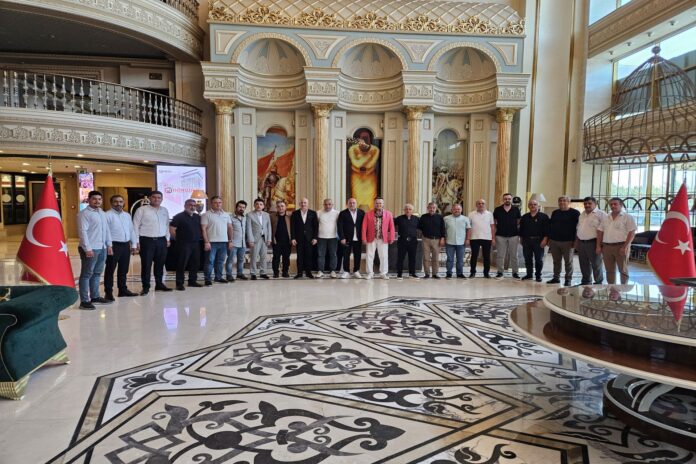On Saturday 29 June, Zeki Demirtaşoğlu, President of DESMÜD, made a press statement at the meeting organised by the Association of Milling and Sector Machinery Manufacturers (DESMÜD) at Konya Grand Millennium Hotel, emphasising the importance of the sector and its plans for the future. Demirtaşoğlu's statements once again revealed the critical role of the milling sector in terms of Turkey's food security and sustainability.
Türkiye ranks second in the world in pasta exports with an annual volume of approximately 1.2 billion dollars. Demirtaşoğlu stated that Türkiye produces a wide range of products starting from basic foodstuffs such as flour and bread to other basic needs such as milk and dairy products, meat and cheese. He stated that milling machines play a critical role at every stage of this production process. Emphasising that food safety, food assurance and sustainability issues have become more important after the pandemic, Demirtaşoğlu said that the milling sector is the main actor in these areas.
Increasing Storage Capacity and Training
Stating that Türkiye's current storage capacity was 2 million tonnes four years ago, Demirtaşoğlu noted that the state has taken important steps to overcome the insufficiency of this capacity through the Turkish Grain Board. He stated that 7 million tonnes of new warehouses have been built in the last four and a half years with the licensed warehousing system and 1.5 billion dollars has been spent on these projects. Thanks to these investments, Türkiye has a professional storage capacity of 9 million tonnes, excluding the warehouses of private companies and factories.
Stating that they attach great importance to education, Demirtaşoğlu said that they opened high schools related to milling in three cities within the framework of the protocol signed with the Ministry of National Education in 2017. He also stated that they established a centre of excellence in Ankara. As a result of their negotiations with the Higher Education Institution, they are planning to open a four-year department under the title of "Milling Science and Technology" at an English-medium university. He emphasised that there are only three schools in the world in this field, and they want to open the fourth one in Turkey.
Demirtaşoğlu stated that they will establish the world's largest private sector, association-owned training centre in Ankara. He stated that with the support of Mansur Yavaş, Mayor of Ankara Metropolitan Municipality, a land worth 3.5 million dollars was allocated and that they will build a training centre with a closed area of 5 thousand square metres on this land. He said that theoretical and practical trainings for mill technologists and operators will be given in this centre. In addition to the trainings, various production lines such as laboratory, biscuit line, pasta line, bakery line and pastry line will be established.
High Value Added Products and Exports
Referring to the importance of producing and exporting high value-added products, Demirtaşoğlu stated that the products produced in Turkey's milling sector have an important place in exports. He emphasised that flour exports bring 1.1 - 1.2 billion dollars to Turkey, but 500 - 600 million dollars more income is obtained by exporting high value-added products. He stated that the export value per kilogram of these products is between 12-72 dollars, therefore they provide 12-16 times more added value than Turkey's average export value.
Support Requests on Exchange Rates and Labour Costs
Zeki Demirtaşoğlu, President of the Association of Mill and Sector Machinery Manufacturers (DESMÜD), made important statements about exchange rates and labour costs at the meeting held in Konya. Demirtaşoğlu stated that labour costs increased by 115% to 120% between June and December last year. He stated that these increases did not only cover workers' salaries, but also reflected on all labour costs such as severance pay, notice pay, SSI premiums and stamp tax.
Demirtaşoğlu said that the increase in the exchange rate in the same period remained at the level of 13% to 15% and this situation negatively affected the cost-income balance of enterprises. Emphasising that labour expenses are the biggest cost item of enterprises, Demirtaşoğlu said, "70% to 85% of our businesses consist of labour expenses. We expect support from the government in this regard. Reductions in the SSI rates and other taxes we pay will relieve our exporters."
In addition, Demirtaşoğlu stated that positive discrimination should be made in the loans requested from Eximbank for exporters and drew attention to the importance of supporting high technology and value-added exports. Demirtaşoğlu said, "Our country wants to separate high technology exports from other exports. Value-added exports also need to be separated from other exports. Ziraat Bank provides 50% interest support for the storage of agricultural products. In the same way, 50% interest support should be provided in the activities to be carried out by our miller brothers."
Lastly, Demirtaşoğlu stated that these supports will increase the contributions to exports and help the sector to grow faster and said, "We will run faster and achieve more success with such supports."
Stating that institutions such as KOSGEB and TÜBİTAK should provide more support to small and medium-sized enterprises, Demirtaşoğlu emphasised that KOSGEB should touch all enterprises by going into the field. He stated that TUBITAK should also include the milling sector and support new projects. Demirtaşoğlu called on the minister of industry and demanded his support.
International Seminars and Symposiums
Stating that they organise international symposiums and fairs as DESMÜD, Demirtaşoğlu said that they are planning to organise an international seminar in Antalya after the international fair held in Istanbul. He stated that they aim to organise this seminar in November or in February or April next year.
Demirtaşoğlu's statements once again revealed that the milling sector plays a critical role in terms of Turkey's food security and sustainability. The studies on education, technology, export and government support and the plans for the future show that the sector will continue its way by getting stronger.







